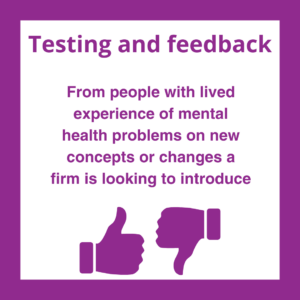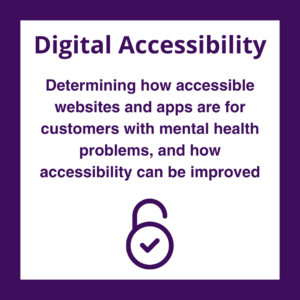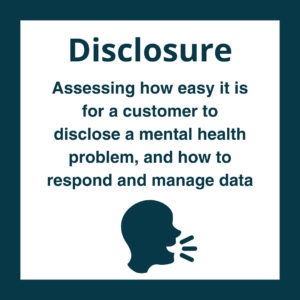
Essential service providers play an important role in helping to break the link between mental health problems and financial difficulty. The Mental Health Accessible team works directly with financial services, utilities suppliers and other essential services on a consultancy basis to help them effectively support customers with mental health problems.
What do we offer?
Our main offering is the Mental Health Accessible accreditation programme, which involves undertaking a full review of a service provider’s customer-facing communications and processes. We use feedback from our Research Community, a group of 5,000 people in the UK with lived experience of mental health problems, along with in-house expertise to inform recommendations for change aiming to improve service experience for customers with mental health problems.
By acting on our recommendations, firms can achieve Mental Health Accessible accreditation status, which demonstrates a strong commitment to making services accessible for people living with mental health problems.
We also offer consultancy services on a bespoke basis. Past projects have covered the following areas:




The team has extensive experience of working with and within essential services firms, allowing for a pragmatic approach which considers both customer and business needs.
Why work with us?
Common symptoms of mental health problems — from difficulties processing information, to challenges using the phone and memory problems — can make it much harder for people to use essential services such as banking and utilities.
We work with essential service providers to help them make changes to communications, policies and business practices to benefit customers with mental health problems.
These adjustments make it easier for them to engage with their providers, and can reduce the negative impact of debts and other financial issues.
Working with us helps firms meet Corporate Social Responsibility goals, as supporting those with mental health problems – which affect one in four of us every year – has a positive societal impact.
We help firms demonstrate compliance with the requirements of various regulators. Typically, our work with financial services clients will involve assessing a firm’s existing practices against the FCA’s six key areas of guidance for the treatment of vulnerable customers, and giving recommendations to achieve a high standard of compliance within each area.
In line with the Consumer Duty, we focus on helping firms to improve customer outcomes across the lifecycle of a product and proactively identifying vulnerable customers and understanding their needs.
A similar approach works well for firms in other sectors, such as utilities and telecoms, as Ofcom and Ofgem have similar requirements for the treatment of vulnerable customers.
Working with us can also help firms ensure they are complying with the Equality Act 2010, which requires service providers to make adjustments for those with both mental and physical disabilities.
In the long run, effective customer communication can reduce complaints, customer service costs and payment arrears. The adjustments we recommend lead to fewer queries and swifter query resolutions. They make it easier for customers with mental health problems to both get in touch and respond to correspondence, and help ensure customers properly understand service terms and conditions at the sign up stage. Accessibility should also lead to fewer distressing calls from customers, which can be stressful and challenging for people working in customer-facing roles.
Many of the difficulties that mental health problem symptoms can lead to when dealing with essential service providers can also result from other vulnerabilities. We often find that starting with mental health is a practical ‘pathfinder’ for taking steps to improve outcomes for vulnerable customers more broadly.
Who we’ve worked with
We’ve worked with leading firms from across essential sectors to help make their services more accessible to customers with mental health problems, including the providers below.







“As one of the UK’s largest financial services providers, we’re proud to be working with Money and Mental Health to better understand how we can improve our services, support and signposting for the millions of our customers who we know will be affected.”
— Kathryn Townsend, Head of Customer Vulnerability at Nationwide and Government Disability & Access Ambassador for the banking sector
“At OVO we understand the importance of making sure energy works for everyone, working with the Money and Mental Health Policy Institute has allowed us to better consider the needs of people living with mental health conditions. The report and recommendations drove clear and tangible actions which we have been able to embed into our support for customers.”
— Steven Donovan, TCF & Consumer Vulnerability Lead at OVO
“We really enjoyed the experience of working with Money and Mental Health, before, during and after the assessment took place. Everyone we worked with had significant knowledge of mental health challenges and the impact it can have on customers’ finances. They also had a sound background of the financial services industry, with a clear understanding of how large organisations work and what is required to complete the accreditation. Money and Mental Health’s report has given us valuable insight on how to better support customers who have experienced mental health problems, providing us with insights rooted in the latest research and actionable strategies to enhance support for our customers facing mental health challenges. In addition, the regular events hosted by Money and Mental Health serve as a vital platform for continuous learning and collaboration.”
— Maxine Pritchard, Head of Financial Inclusion and Vulnerability at HSBC UK
Watch the video below on the accreditation process for Lloyds Bank to learn more about how we can work with your firm:
Register your interest
Learn more about our Mental Health Accessible programme and how we’re helping firms.
To set up a call to discuss how we can support your team, fill out the contact form or email our Head of Strategic Partnerships Rosie Normanton: [email protected]